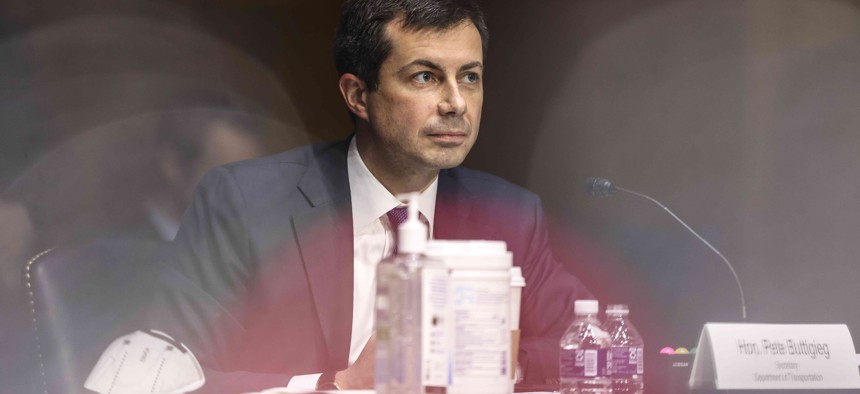House Republicans Slam Buttigieg Over Infrastructure Law Rollout

Transportation Secretary Pete Buttigieg, testifies before a Senate Appropriations Committee hearing in April. Oliver Contreras-Pool/Getty Images
They say the Transportation Department is flouting Congress with how it is managing programs funded by the $1.2 trillion package.
Transportation Secretary Pete Buttigieg just got a glimpse of what his relationship with House GOP lawmakers might look like if Republicans take control of the chamber after the November elections. It wasn’t pretty.
U.S. Rep. Sam Graves, the top-ranking Republican on the U.S. House Committee on Transportation and Infrastructure, sent the transportation secretary a five-page letter Friday. In the letter, Graves accused Buttigieg and the Biden administration of “pursuing its own woke priorities” and a “radical agenda” while ignoring the restrictions Congress has placed on transportation programs
“In his first year, President Biden issued more executive orders and approved more major rules than any recent president. We are concerned that such reliance on the administrative state undermines our system of government. Our founders provided Congress with legislative authority to ensure lawmaking is done by elected officials, not unaccountable bureaucrats,” Graves wrote.
The top Republican on each of the subcommittees for the transportation panel also signed the letter.
Buttigieg and Democrats on the transportation committee did not respond to requests for comment.
Graves repeatedly cited a 6-3 decision the U.S. Supreme Court handed down in late June. The majority in that case, West Virginia v. EPA, ruled that the Environmental Protection Agency could not regulate carbon dioxide pollution generated by power plants, despite language from the Clean Air Act that suggested it could.
The conservative majority said that such “major questions” should be decided by Congress, not regulatory agencies.
“Capping carbon dioxide emissions at a level that will force a nationwide transition away from the use of coal to generate electricity may be a sensible solution to the crisis of the day,” Chief Justice John Roberts wrote for the majority. “But it is not plausible that Congress gave EPA the authority to adopt on its own such a regulatory scheme in [the section of the Clean Air Act that regulates power plants].”
“A decision of such magnitude and consequence rests with Congress itself, or an agency acting pursuant to a clear delegation from that representative body,” he continued.
(On the other hand, the Supreme Court ruled in 2007 that the Clean Air Act required the EP to regulate carbon dioxide pollution, in a case dealing with vehicle emissions.)
In the letter to Buttigieg, Graves said the West Virginia case “stands as another reminder that Congress is the entity ultimately responsible for writing the law in the United States.”
“We are concerned over the promulgation of recent DOT rules and guidance materials that, we believe, seek to implement policies that were either rejected by Congress or are demonstrative of perverse agency decision-making,” Graves and the other Republican lawmakers wrote.
“This is compounded by Biden Administration-led efforts to impose partisan policies government-wide. Furthermore, it appears as though DOT and the administration are implementing these policies that violate the spirit of law,” they added.
Graves gave several examples of what he saw as overreach by Biden’s Transportation Department, including:
- A December memo from Stephanie Pollack, the deputy administrator of the Federal Highway Administration, that laid out the agency’s approach to the use of money that Congress approved in the Infrastructure Investment and Jobs Act.
- A FHWA proposal from July that would require states and metropolitan planning organizations to measure and make plans to reduce greenhouse gas emissions. Graves said the proposal “seems similar” to the power plant regulations the high court struck down in June. Graves also asserted that “Congress considered and ultimately rejected a [greenhouse gas] performance measure requirement during the development of IIJA,” a point difficult to confirm, because almost all of the negotiations over details of the infrastructure package occurred in private.
- The Transportation Department including “merit” criteria on top of requirements in the law for judging grant applications for major infrastructure projects. The criteria at issue would measure a project’s ability to further safety, maintain a state of good repair, help the local economy, mitigate environmental impacts, further equity and promote innovation. “By scoring projects against this merit criteria, DOT is effectively changing the purpose of the discretionary grant programs, once again, in contradiction of IIJA,” Graves wrote.
- The Biden administration’s rollout of its Justice40 Initiative, which seeks to direct 40% of the overall benefits of grant funds in certain programs to disadvantaged communities. Graves noted that the administration would determine which areas qualify as “disadvantaged.” “This is unacceptable. The Biden administration cannot simply rule by decree; it must follow congressional intent. Imposing Justice40 across DOT programs in such a cross-cutting fashion is alarming, and we are concerned that DOT’s implementation of this initiative will undermine the intent of the laws enabling the affected programs,” Graves wrote.
The Republican lawmakers asked Buttigieg to provide extensive documentation about the role the White House had in forming the transportation department’s policies, pending and expected rules the department planned to issue, and details of how Justice40 would be implemented.
Graves’ letter comes not only a few weeks before the November midterm elections, but also a few days before Democrats, who currently control the House transportation committee, plan to hold a hearing on the importance of infrastructure laws passed since Biden took office.
Daniel C. Vock is a senior reporter for Route Fifty based in Washington, D.C.
NEXT STORY: 3 Reasons Hurricane Ian Poses a Major Flooding Hazard for Florida






